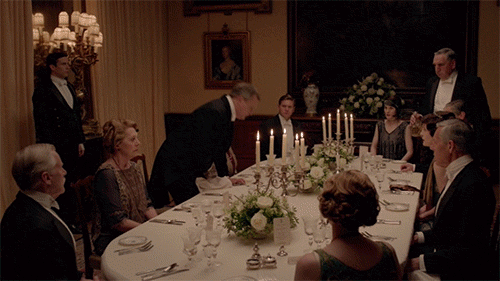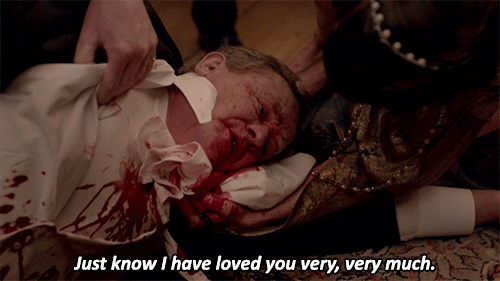'Downton Abbey' Director Talks That Dinner Scene Shocker
Warning: This interview about the the fifth episode of Downton Abbey’s final season contains spoilers.
Downton Abbey fans have watched Lord Grantham’s discomfort come and go in the show’s final season, but few would have been expecting it to culminate in the Great Ulcer Burst of 1925.
In Sunday’s episode, as the war between the Dowager Countess and Isobel raged on in front of a dinner guest, the Minister of Health, Robert (Hugh Bonneville) rose from the table — then projectile-vomited blood across it. Twice.
Related: ‘Downton Abbey’ Recap: Bad Blood
The jolt was intentional, director Michael Engler tells Yahoo TV. “There’s a long theoretical lead up about the changing of the hospital system and what it would mean to the community. The idea of something as sudden and shocking and real as what happens to Robert bringing it all into focus and taking it away from the theoretical into the emotional was a good way of reminding people what was at stake,” he says.
Below, the two-time Emmy nominee (30 Rock, Sex and the City) — who’s currently up for a Directors Guild of America Award for helming the Downton series finale — answers our burning questions.

What all goes into rehearsing a moment like this?
We had a physician there while we were working it out with the special effects people, the people who make that kind of blood, and the makeup people. Because there would be a certain amount of blood that had built up in his stomach, and that would get a certain color, and then, the second time he vomited up blood, it would be fresh blood, so that would be a different color. You have to examine the difference between how it looks in real life and how it looks on screen, so we did some experiments with that, to make sure that it was the right colors and texture and realistic.
When you shoot something like that, you have to break it up into so many pieces for him to be able to play the moments before, and the moments after, and get the blood in his mouth. So we talked through how we would shoot it. We needed to really know how the blood was going to move, and how it was going to spray, because we needed to know how many people were going to need how many different copies of their costume, so we could reset them. There’s a certain amount of that kind of really technical stuff that you have to figure out in a rehearsal like that.

I heard Elizabeth McGovern’s Cora getting sprayed wasn’t scripted.
These things you can only control to a certain extent, because in order for it to be real, Hugh has to surrender control to a kind of convulsion. We didn’t expect much at all, if any, to spray on her, and then more did. What was incredible about it was, the first time that it happened we did have a camera on her, and so it really got the reaction of that.
I think it made it even more powerful, because without it being super gory, it just becomes a little bit more visceral. The thing about Downton is, because it is so restrained, when a very unrestrained moment like that happens, it’s the shocking reminder that reality is the same for everybody, when you get right down to it. You see him push it down, and push it down, and push it down, and then, finally it erupts — that’s just a physiological event that’s beyond anybody’s control. Even this man, who’s really the essence of that British stiff upper lip, is subject to the realities of physical, scientific, medical nature.
How many takes did you do on the day of filming?
You need a lot of different reactions, and a lot of different angles, but we managed to keep the coughing up blood part of it to two. Part of that was also so we wouldn’t have to reset everybody’s costume. To reset that whole table — change the linens, the flowers, the plates, and everything — takes about a half an hour.
Sometimes the hardest things to do are the least stressful, because you break them down into almost mathematical pieces where you think, “Okay, from this angle we need to see this and this. From this angle, we don’t need to see blood spray, but we will need to see blood on the table. From this angle…” Then, I just talk the whole cast and crew through what the order will be. I would say, "We’re going to take the whole scene, in the big wide shot, up until the blood, and we’ll get that as many times until we’re happy with it. Then, this angle up until the blood. When we have those things, then we’ll start with a few angles at a time with the blood.” Everybody understood what they needed to do in each take, in each angle that we were shooting. Everybody understood in this moment, this is the most important thing for me or for the shot, knowing that Hugh had the hardest part in it, and therefore, in the moments that really focused on Hugh, the important thing was to make sure nothing got in the way of what he needed.
How did he handle that fake blood?
The part that sprayed, he had to have so much come out. Talking with the doctor, she said, “You know, it would be about a half a cup each time.” That’s how much it would be that would build up, and then would cause him to reject it. He had to drink a half a cup of those two batches of fake blood. I don’t even know exactly what they make it out of, except that it’s obviously something that, if he swallows it, it’s not toxic. It won’t stain the $600,000 carpets at Highclere [Castle]. Just in the middle of the moment, a prop person would come in and hand it to him, and he would drink it, and then he would continue. It’s all there in the editing room, just taking it apart, and those moments in between.
We wanted it to be as realistic as possible, from a number of standpoints. The medical reality is going to be true from whenever it is, whether it’s today or 1925. But how they reacted to it, and how the medical people of the time dealt with it, would be different.

When Robert professes his love to Cora, was that the only line you tried?
That was the only line scripted, and the only line we tried. It’s very rare we divert. By the time we’re on set, the script is pretty much locked. Sometimes, after a draft comes out, we’ll talk about it and changes will happen, and then, maybe after the actors read it, they’ll have notes, feedback for me or for [creator/writer] Julian [Fellowes], and then he might change some things. He often does — he’s extremely receptive to their feedback. He knows very much what he wants it to be, so by the time you get to shooting, it’s very rare that a line changes.
There are so many moving moments in the final season that are moving because the actors are saying these lines to each other as well. Hugh and Elizabeth, they’ve done so many fascinating projects, so much good work over so many years, and here is a thing that came along and really was beyond anybody’s dreams — the impact it would have on the world, and on their careers.
I think in a moment like that, the two of them there, it was completely real. The thought of them saying goodbye forever to each other was a very poignant one, that they’re going to move on and this chapter of their lives is going to be over. In a funny way, I think it was just a very natural thing to happen.
When this episode aired in the UK, reactions were strong. Fans there were warned there would be a shocking scene, but they were not prepared for this. Tweets ranged from people comparing it to scenes from Game of Thrones and Alien, people saying they needed a drink, people suggesting they’d tell their boss that they have an ulcer so they wouldn’t have to go into work because now everyone has seen what could happen. Did you keep tabs on that?
I didn’t really. I mean, I like reading little bits. For me, it’s when I’m in a mix for sound, or when I’m looking at it all cut together with people in an editing room who haven’t seen it, I clock their reaction. Because once you’ve set it up, and directed it, and shot it, and edited it, it’s hard to be surprised by it. I would look at the producers, or other people who haven’t seen it yet, and watch for their reaction slyly. These are all people who had read the scripts and been there when we were shooting, but they were seeing it cut together for the first time. Watching them react, that’s really when I knew we had it. I saw them react in the same way that you would if you saw that happen to a friend of yours.
Related: 'Downton Abbey’: Allen Leech Shares the Stories Behind 9 Photos
Downton Abbey airs Sundays at 9 p.m. on Masterpiece on PBS.

